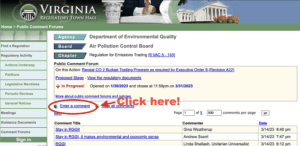(Scroll to the bottom for the comment link and directions.)
In 2020, Virginia joined the Regional Greenhouse Gas Initiative (RGGI) through the passage of the Clean Energy and Community Flood Preparedness Act. RGGI is a market-based, cap-and-invest initiative to reduce greenhouse gas emissions. Greenhouse gas emissions contribute to air pollution and trap heat in the earth’s atmosphere, causing climate change. RGGI’s 11 participating states–Connecticut, Delaware, Maine, Maryland, Massachusetts, New Hampshire, New Jersey, New York, Pennsylvania, Rhode Island, Vermont, and Virginia–established a regional cap on CO2 emissions which sets a limit on the emissions from regulated power plants within those states. The cap gets smaller over time as fewer emissions are allowed. Power plants must acquire allowances for the CO2 they emit. Allowances are purchased at quarterly auctions. Revenue from the auctions is reinvested back into the participating states. So far, RGGI emissions have reduced by more than 50%, twice as fast as the nation as a whole, and have raised nearly $6 billion to invest in local communities. You can learn more about RGGI at https://www.rggi.org/ and at https://vaeec.org/rggi/.
What does RGGI money fund?
Since joining RGGI less than three years ago, Virginia has brought in almost $590 million in revenue from nine quarterly RGGI auctions.
Half of this revenue goes to the Department of Housing and Community Development’s Housing Innovations in Energy Efficiency program (HIEE). This money is split between the Affordable and Special Needs Housing (ASNH) program and the Weatherization Deferral Repair (WDR) program.
- The ASNH program funds the creation and preservation of energy efficient affordable housing units for low-income and extremely low-income households.
- The WDR program funds major repairs that have caused homes to be deferred from the federally-funded Weatherization Assistance Program. Once the home is repaired, it receives weatherization, such as insulation, air sealing, and energy efficient light bulbs, to make the home healthier, safer, and more energy efficient.
Another 45% of the RGGI revenue goes to the Virginia Community Flood Preparedness Fund Grant, supporting regions and localities across Virginia to reduce the impacts of flooding. So far, the fund has awarded close to $100 million through three rounds of grants.
The remaining 5% of the revenue goes to administrative expenses (3%) and low-income energy efficiency programs (2%).
The Air Pollution Control Board is receiving public comments on this decision until March 31. Thousands of people, and 90% of comments, have been in favor of RGGI. Please add your comment here. Any comment in support of RGGI will be counted, even if it is as short as, “Don’t take Virginia out of RGGI.”
The pressure is building on the Board, and these comments will also have an influence on any future court case that decides whether the administration followed the law. Please comment today!
When you get to the website, click the “Enter a comment” link to share your thoughts with the Board. Make sure you hit Submit at the bottom of that page for your comment to be recorded. (See the image below.)





